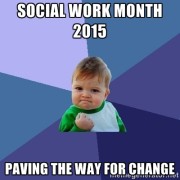Work-Life Balance
Dear Readers,
When I first started this particular version of my blog, I had such high hopes of making and keeping to a regular posting schedule. The more time that passed from my last blog post, the more guilt I felt, and the harder it was to come up with a topic to write about. Every sentence I typed felt like it sucked, and I developed a keen sense of self-consciousness that no one wanted to hear anything that I had to say anyway.
I work in a very demanding profession, and the past several months have been brutal for me. I have some new very complicated cases that are stretching my capabilities to their breaking points. I am behind on paperwork, which while being a constant, makes me feel like any time spent writing should be spent writing progress notes. I am feeling very burned out, in general.
During the past several months I also had to go through and edit my book after it came back from the editor, and while I started the process feeling optimistic and excited, I quickly found myself drowning in doubt in that area as well. What had I written? Why would I think anyone would want to read it?
It is no secret to anyone who knows me that I suffer from depression, and that my symptoms are easily triggered whenever I start to feel overwhelmed, when I feel things starting to slip away from me. In the last months, I took on a second job, and a time-consuming volunteer opportunity — along with the challenging cases and the book edits — and it was way more than I could chew. I became very symptomatic, which meant I spent more energy avoiding things than doing things.
So how do you come back from that and be like, hi! I’m blogging again! Hope you keep reading! Do you acknowledge the lapse or ignore it and hope everyone else does too? Do you talk about your depression? Do you talk about how being a part-time writer with a full-time job is super challenging? I somehow doubt that’s the way to connect with fans and sell books. And yet…
Hi! I’m blogging again! I am going to a cider festival this weekend, of which I will be writing a review. I want to talk about the exciting things other authors in the Blue Zephyr Press group are doing. I want to say that my book cover is almost done and I can’t wait to share it with everyone once the final touches are done. I want to talk about other cool book-related things and life related things. And I will!
But first I wanted to write this: writing of any kind is a practice in vulnerability. I have spent enough time in my past life as a marketing person and public relations executive to know that a public image is something that should be carefully cultivated and maintained. There isn’t a lot of room in that cultivation for genuine vulnerability. But I think it is my fear of being vulnerable in this space that is holding me back from the very thing I want to do as a writer — connect with readers. So in the name of vulnerability and connection, I can’t just start this blog up again without any explanation of why it has been months since my last post.
And the explanation is this: a work-life (or sometimes, work and other-more-creative-work) balance is very hard to maintain. I am working on doing a better job with that balance, and I hope you follow along my journey as I do.
Till next week!
–Jennae

